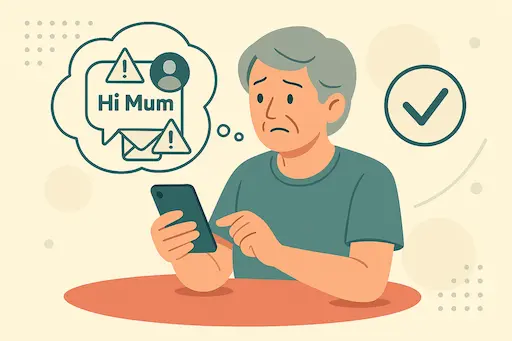How to Spot a Scam Online
A simple guide for staying safe with email, messages, and social media
Estimated reading time: 5 minutes

How do I know if this is real?
Scams are getting trickier.
They’re not just about Nigerian princes anymore — scammers now pretend to be banks, government agencies, delivery companies, even your own friends.
If you’ve ever thought, “This doesn’t feel quite right,” trust that feeling.
This guide will help you slow down, spot the red flags, and stay safer online.
First: What do scammers want?
Most scams try to get one (or more) of these things:
- Your money
- Your personal information (like your name, address, or IRD number)
- Access to your accounts or device
They might do it by pretending to:
- Be someone you know
- Offer a prize or refund
- Warn you about a fake problem
- Ask for help or support
- Rush you into a decision
Common scams to watch out for
1. “Your package couldn’t be delivered”
Looks like: a text or email from NZ Post or a courier asking you to click a link
- 🚩 If you didn’t order anything, ignore it.
- 🚩 Never enter card details from a message like this.
2. “Someone logged into your account”
Looks like: an email pretending to be from Google, Facebook, or your bank
- 🚩 Check the sender’s address. Is it from a strange domain?
- 🚩 Don’t click. Go directly to the site instead.
3. “You’ve won a prize!”
Looks like: a flashy message or fake ad on Facebook
- 🚩 No real company gives away prizes without contact details or rules.
- 🚩 They’ll often ask for payment info ‘to claim’ the prize — this is a trap.
4. “Hi Mum, I got a new number”
Looks like: a message from a ‘child’ or relative who needs help
- 🚩 Don’t send money unless you’ve confirmed it’s really them.
- 🚩 Call or message their usual number first.
5. Fake profiles and romance scams
Looks like: someone friendly or flirty adds you online out of nowhere
- 🚩 They often seem “too perfect” and move quickly to talk privately
- 🚩 If they ask for money, gift cards, or help — it’s a scam
How to spot a fake email or profile
✉️ Emails: Watch for…
- Spelling mistakes or odd grammar
- Weird sender addresses (e.g.
support@secure-banking.co.nz.fakewebsite.ru) - Urgent or emotional language (“Click now!” “You must act today!”)
- Links that don’t match the company’s real website
Tip: Hover over a link (or press and hold on a phone) to see where it really goes.
👤 Social media profiles: Watch for…
- Very few posts or photos
- Lots of attractive selfies but no tagged friends or real comments
- They ask to move to WhatsApp, Messenger, or email quickly
- They get personal fast — saying “I love you” or “I trust you” after only a few chats
Best practices for staying safe
✅ Don’t click links in strange messages or emails
Go to the official website or app instead.
✅ Don’t give out personal info to people you don’t know
That includes your address, IRD number, driver’s licence, bank details, or even your birthday.
✅ Pause before sending money
Double-check everything. Scammers often create fake urgency.
✅ Use strong, different passwords
Write them down in a safe place, or use a password manager.
✅ Talk to someone you trust
If you’re unsure — stop and ask. Scammers want you to act alone and in a hurry.
One last thing: It’s not your fault
Scammers are very good at what they do.
They trick smart, kind, thoughtful people every day.
The best thing you can do is slow down, ask questions, and never be embarrassed to double-check.
If this guide helped, we’re also working on a one-page “Is This Real?” checklist you can print out and keep near your phone or computer. Stay tuned.
And if you’d like more gentle, practical support to build better digital habits, try our free 7-Day Privacy Bootcamp — made for real life, not tech experts.